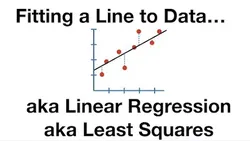
Building Regression Models with Linear Algebra 
This course teaches students how to use linear algebra to build regression models. Through hands-on practice with Python, students will learn to distinguish between different types of regression models and apply the Method of Least Squares to datasets. They will also gain the skills to identify scenarios using linear regression models. ▼
ADVERTISEMENT
Course Feature
![]() Cost:
Cost:
Free
![]() Provider:
Provider:
Coursera
![]() Certificate:
Certificate:
Paid Certification
![]() Language:
Language:
English
![]() Start Date:
Start Date:
29th May, 2023
Course Overview
❗The content presented here is sourced directly from Coursera platform. For comprehensive course details, including enrollment information, simply click on the 'Go to class' link on our website.
Updated in [March 06th, 2023]
Unlock the Exciting World of Learning! Here's What Awaits You: In this course, you'll learn how to distinguish between the different types of regression models and apply the Method of Least Squares to a dataset by hand and using Python. You'll also gain an understanding of how to employ a linear regression model to identify scenarios. Additionally, you'll gain an understanding of linear algebra and its application to regression models. Finally, you'll be able to apply the concepts you've learned to real-world datasets. With this course, you'll be able to confidently build regression models with linear algebra.
[Applications]
After completing this course, students will be able to apply the concepts of linear algebra to build regression models. They will be able to use the Method of Least Squares to analyze datasets and identify scenarios. Furthermore, they will be able to use Python to create regression models and interpret the results.
[Career Paths]
1. Data Scientist: Data Scientists use a variety of techniques to analyze data and develop predictive models. They use linear algebra to build regression models and use them to identify trends and patterns in data. With the increasing demand for data-driven decision making, the demand for data scientists is expected to grow significantly in the coming years.
2. Machine Learning Engineer: Machine Learning Engineers use linear algebra to develop algorithms and models that can be used to automate tasks. They use linear algebra to build regression models and use them to identify trends and patterns in data. With the increasing demand for automation, the demand for machine learning engineers is expected to grow significantly in the coming years.
3. Business Analyst: Business Analysts use linear algebra to analyze data and develop insights that can be used to inform business decisions. They use linear algebra to build regression models and use them to identify trends and patterns in data. With the increasing demand for data-driven decision making, the demand for business analysts is expected to grow significantly in the coming years.
4. Quantitative Analyst: Quantitative Analysts use linear algebra to develop mathematical models and algorithms that can be used to analyze data and make predictions. They use linear algebra to build regression models and use them to identify trends and patterns in data. With the increasing demand for data-driven decision making, the demand for quantitative analysts is expected to grow significantly in the coming years.
[Education Paths]
1. Bachelor's Degree in Mathematics: A Bachelor's Degree in Mathematics is a great way to gain a comprehensive understanding of linear algebra and its applications. This degree will provide you with the skills to analyze data, develop models, and solve complex problems. Additionally, you will learn how to use linear algebra to create predictive models and identify trends.
2. Master's Degree in Data Science: A Master's Degree in Data Science is a great way to gain a comprehensive understanding of data analysis and machine learning. This degree will provide you with the skills to analyze large datasets, develop models, and solve complex problems. Additionally, you will learn how to use linear algebra to create predictive models and identify trends.
3. Doctorate Degree in Statistics: A Doctorate Degree in Statistics is a great way to gain a comprehensive understanding of statistical methods and their applications. This degree will provide you with the skills to analyze data, develop models, and solve complex problems. Additionally, you will learn how to use linear algebra to create predictive models and identify trends.
4. Master's Degree in Artificial Intelligence: A Master's Degree in Artificial Intelligence is a great way to gain a comprehensive understanding of machine learning and its applications. This degree will provide you with the skills to analyze data, develop models, and solve complex problems. Additionally, you will learn how to use linear algebra to create predictive models and identify trends.
Pros & Cons

Excellent course for future

Course is broken.
Course Provider

Provider Coursera's Stats at AZClass
Discussion and Reviews
0.0 (Based on 0 reviews)
Explore Similar Online Courses

Introduction to Sound Design for Moving Images

Sound Synthesis Using Reaktor

Python for Informatics: Exploring Information

Social Network Analysis

Introduction to Systematic Review and Meta-Analysis

The Analytics Edge

DCO042 - Python For Informatics

Causal Diagrams: Draw Your Assumptions Before Your Conclusions

Whole genome sequencing of bacterial genomes - tools and applications

Data Science: Linear Regression

Simple Linear Regression for the Absolute Beginner

Linear Regression and Linear Models
 Related Categories
Related Categories
 Popular Providers
Popular Providers
Quiz
 Submitted Sucessfully
Submitted Sucessfully
1. What is the Method of Least Squares?
2. What is the purpose of linear regression?
3. What is the best way to apply the Method of Least Squares?
4. Which of the following is NOT a type of regression model?


Start your review of Building Regression Models with Linear Algebra